
Todd Harry Rundgren is an American musician, singer, songwriter, and record producer who has performed a diverse range of styles as a solo artist and as a member of the bands Nazz and Utopia. He is known for his sophisticated and often unorthodox music, his occasionally lavish stage shows, and his later experiments with interactive art. He also produced music videos and was an early adopter and promoter of various computer technologies, such as using the Internet as a means of music distribution in the late 1990s.
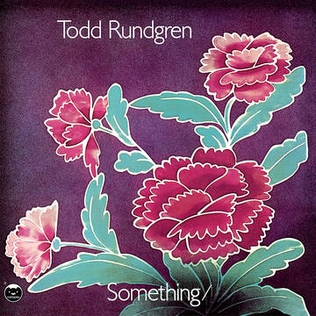
Something/Anything? is the third album by American musician Todd Rundgren, released in February 1972. It was Rundgren's first album released under his own name, following two records credited to the quasi-group project Runt, and was also his first double album. It was recorded in late 1971 in Los Angeles, New York City and Bearsville Studios, Woodstock. The album is divided into four sections focused on different stylistic themes; the first three parts were recorded in the studio with Rundgren playing all instruments and singing all vocals in addition to producing. The final quarter contained a number of tracks recorded live in the studio without any overdubs, save for a short snippet of archive recordings from the 1960s.

Todd is the fifth studio album by American musician Todd Rundgren, released in February 1974 on Bearsville Records. It is the follow-up to the previous year's A Wizard, a True Star and features a comparatively heavier reliance on guitar playing and synthesizers. About half of the tracks were performed by Rundgren alone, with the other half recorded with varying configurations of musicians. In the US, the album peaked at number 54, while lead single "A Dream Goes On Forever" reached number 69.

Initiation is the sixth album by American musician Todd Rundgren, released May 23, 1975 on Bearsville Records. With this album, Rundgren fully embraced the synthesized prog sound he had begun exploring in more depth in his work with his band Utopia. However, unlike Utopia, in which Rundgren had limited himself to playing guitar, much of the synthesizers on Initiation were played and programmed by Rundgren himself.

Hermit of Mink Hollow is the eighth album by American musician Todd Rundgren, released May 1978 on Bearsville Records. All of the instruments and vocals were performed by Rundgren. He intended the songs on the album to be performed on piano with minimal arrangements, apart from the bass, drums and voices, and for the material to showcase his newly refined singing ability.

Faithful is the seventh studio album by Todd Rundgren, released in May 1976.
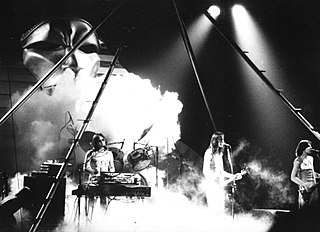
Utopia was an American rock band formed in 1973 by Todd Rundgren. During its first three years, the group was a progressive rock band with a somewhat fluid membership known as Todd Rundgren's Utopia. Most of the members in this early incarnation also played on Rundgren's solo albums of the period up to 1975. By 1976, the group was known simply as Utopia and featured a stable quartet of Rundgren, Kasim Sulton, Roger Powell and John "Willie" Wilcox. This version of the group gradually abandoned progressive rock for more straightforward rock and pop.
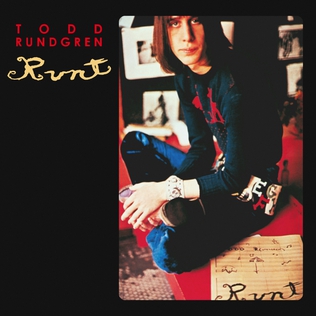
Runt is the self-titled debut album of the band Runt, commercially released September 1970. Runt was a trio consisting of Todd Rundgren, Hunt Sales (drums), and Tony Fox Sales (bass). The entire album was written and produced by Rundgren, formerly of Nazz, and he performed most of the instruments. Many regarded Runt as Rundgren's debut solo album, and later reissues credit the album to Rundgren rather than to the group.
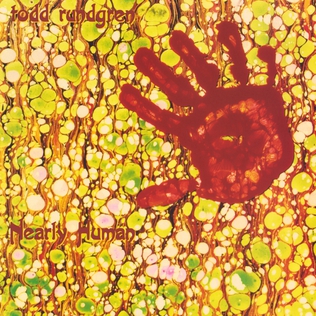
Nearly Human is a 1989 album by the rock musician Todd Rundgren, released by Warner Bros. Records. It was his first release in four years, although he had been active as a producer in the intervening years. Many of the album's songs deal with loss, self-doubt, jealousy and spiritual recovery. It was also the first collaboration between Rundgren and Michele Gray, a singer and ex-model who helped to organize the sessions. Gray sang backing vocals, both on the record and on subsequent tours, and the pair later married.

Swing to the Right is the sixth studio album by Utopia. It followed the Beatles parody-homage Deface the Music. Swing to the Right moves into hard-edged commentary on corporate raiders, warmongers, political villains, and despicable music industry moguls. There is little in the way of progressive rock on this album, which is limited to its title track.

Kasim Sulton is an American bass guitarist, keyboardist and vocalist. Best known for his work with Utopia, Sulton sang lead on 1980's "Set Me Free," Utopia's only top 40 hit in the United States. As a solo artist, Sulton hit the Canadian top 40 in 1982 with "Don't Break My Heart".
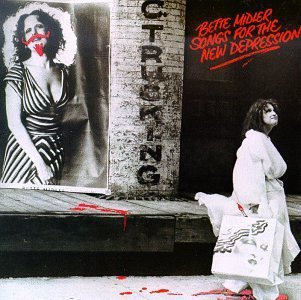
Songs for the New Depression is the third studio album by the American singer Bette Midler, released in early 1976 on the Atlantic Records label. The album was released on CD for the first time in 1990. A remastered version of the album was released by Atlantic Records/Warner Music in 1995. A limited edition remastered version of the album was released by Friday Music in 2014.

Back to the Bars is a live album by rock musician Todd Rundgren, which was released as a double LP in 1978.

Another Live is a live album by the progressive rock band Utopia. It was recorded in August 1975 and released in 1975 on Bearsville.

War Babies is the third studio album by American pop music duo Daryl Hall & John Oates. The album was released in October 1974, by Atlantic Records. It was their last of three albums for Atlantic Records before moving to RCA Records. The album was produced by Todd Rundgren. Rundgren and other members of Utopia, his then-recently-formed prog-rock band, perform on the record.
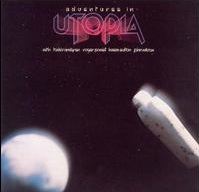
Adventures in Utopia is the fourth studio album by Utopia.

Todd Rundgren's Utopia is the debut album by the American rock band Utopia, released in October 1974 on Bearsville Records. The band was formed in 1973 by musician, songwriter, and producer Todd Rundgren who decided to expand his musical style by moving from pop-oriented rock towards progressive rock. He assembled a six-piece group that featured three keyboardists and toured as a live act. Most of the album was recorded in the studio except "Utopia", the opening track, which was recorded live in concert April 25th, 1974.

Oops! Wrong Planet is the third studio album by American rock band Utopia. It delivers a markedly trimmed down, pop-oriented direction for the band following the progressively influenced previous album, Ra.

POV is the ninth and final studio album by the rock group Utopia, released in January 1985. It peaked at #161 on the Billboard 200 charts. Except for a live 1992 reunion album, this was the last album released by Utopia, and Rundgren's final studio work under the Utopia banner.
John "Willie" Wilcox is an American drummer, vocalist, producer, recording engineer, sound designer, composer, and senior audio director. He is best known for being a member of the band Utopia. He also has been the senior audio director for Bally Technologies and Scientific Games in Las Vegas, Nevada from 2010 to 2020.



















